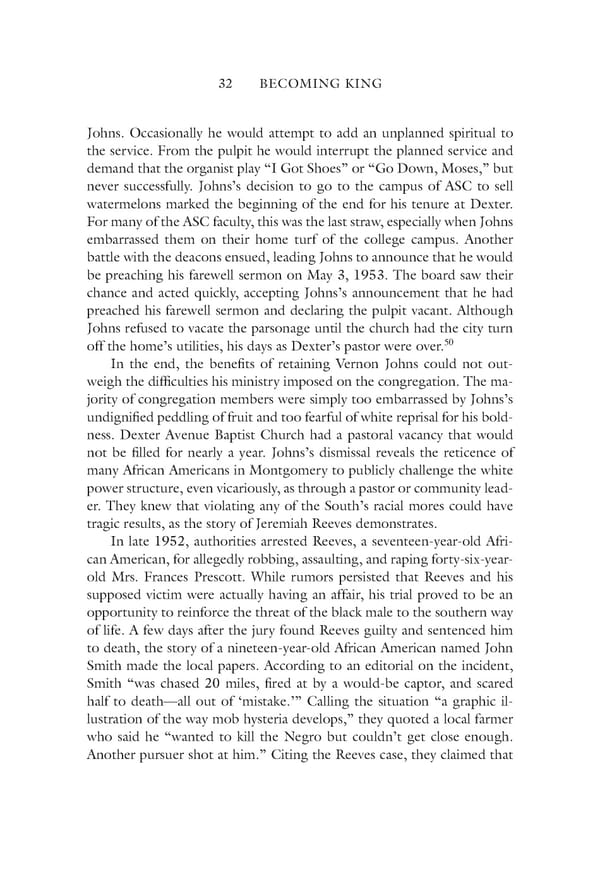32 BECOMING KING Johns. Occasionally he would attempt to add an unplanned spiritual to the service. From the pulpit he would interrupt the planned service and demand that the organist play “I Got Shoes” or “Go Down, Moses,” but never successfully. Johns’s decision to go to the campus of ASC to sell watermelons marked the beginning of the end for his tenure at Dexter. For many of the ASC faculty, this was the last straw, especially when Johns embarrassed them on their home turf of the college campus. Another battle with the deacons ensued, leading Johns to announce that he would be preaching his farewell sermon on May 3, 1953. The board saw their chance and acted quickly, accepting Johns’s announcement that he had preached his farewell sermon and declaring the pulpit vacant. Although Johns refused to vacate the parsonage until the church had the city turn 50 off the home’s utilities, his days as Dexter’s pastor were over. In the end, the benefits of retaining Vernon Johns could not out- weigh the difficulties his ministry imposed on the congregation. The ma- jority of congregation members were simply too embarrassed by Johns’s undignified peddling of fruit and too fearful of white reprisal for his bold- ness. Dexter Avenue Baptist Church had a pastoral vacancy that would not be filled for nearly a year. Johns’s dismissal reveals the reticence of many African Americans in Montgomery to publicly challenge the white power structure, even vicariously, as through a pastor or community lead- er. They knew that violating any of the South’s racial mores could have tragic results, as the story of Jeremiah Reeves demonstrates. In late 1952, authorities arrested Reeves, a seventeen-year-old Afri- can American, for allegedly robbing, assaulting, and raping forty-six-year- old Mrs. Frances Prescott. While rumors persisted that Reeves and his supposed victim were actually having an affair, his trial proved to be an opportunity to reinforce the threat of the black male to the southern way of life. A few days after the jury found Reeves guilty and sentenced him to death, the story of a nineteen-year-old African American named John Smith made the local papers. According to an editorial on the incident, Smith “was chased 20 miles, fired at by a would-be captor, and scared half to death—all out of ‘mistake.’” Calling the situation “a graphic il- lustration of the way mob hysteria develops,” they quoted a local farmer who said he “wanted to kill the Negro but couldn’t get close enough. Another pursuer shot at him.” Citing the Reeves case, they claimed that
 Becoming King: Martin Luther King Jr. Page 52 Page 54
Becoming King: Martin Luther King Jr. Page 52 Page 54